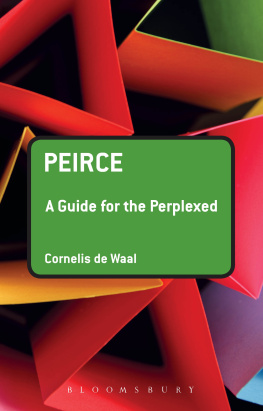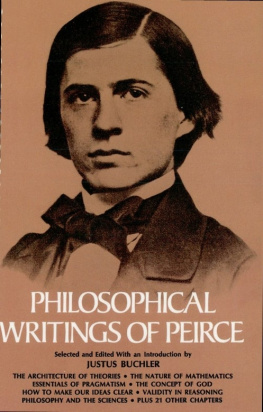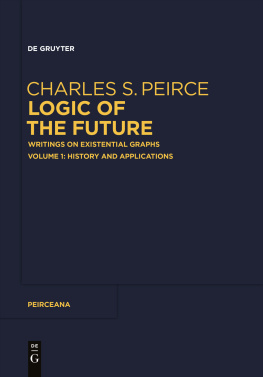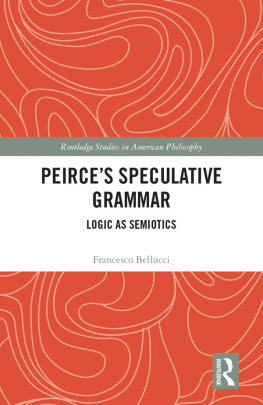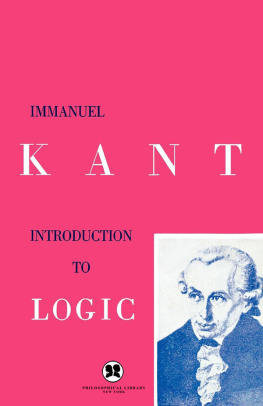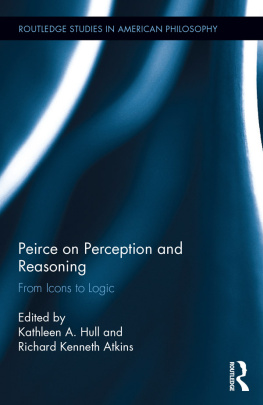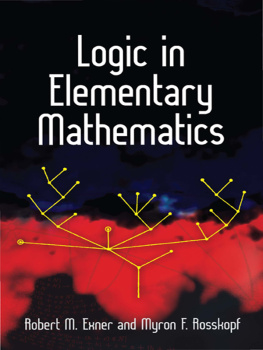Peirce
GUIDES FOR THE PERPLEXED
Guides for the Perplexed are clear, concise, and accessible introductions to thinkers, writers, and subjects that students and readers can find especially challenging. Concentrating specifically on what it is that makes the subject difficult to grasp, these books explain and explore key themes and ideas, guiding the reader toward a thorough understanding of demanding material.
Adorno: A Guide for the Perplexed , Alex Thomson
Aquinas: A Guide for the Perplexed , Pater S. Eardley and Carl N. Still
Arendt: A Guide for the Perplexed , Karin Fry
Aristotle: A Guide for the Perplexed , John Vella
Augustine: A Guide for the Perplexed , James Wetzel
Bentham: A Guide for the Perplexed , Philip Schofield
Berkeley: A Guide for the Perplexed , Talia Bettcher
Deleuze: A Guide for the Perplexed , Claire Colebrook
Derrida: A Guide for the Perplexed , Julian Wolfreys
Descartes: A Guide for the Perplexed , Justin Skirry
The Empiricists: A Guide for the Perplexed , Laurence Carlin
Existentialism: A Guide for the Perplexed, Stephen Earnshaw
Freud: A Guide for the Perplexed , Celine Surprenant
Gadamer: A Guide for the Perplexed , Chris Lawn
Habermas: A Guide for the Perplexed , Lasse Thomassen
Hegel: A Guide for the Perplexed , David James
Heidegger: A Guide for the Perplexed , David Cerbone
Hobbes: A Guide for the Perplexed , Stephen J. Finn
Hume: A Guide for the Perplexed , Angela Coventry
Husserl: A Guide for the Perplexed , Matheson Russell
Kant: A Guide for the Perplexed , TK Seung
Kierkegaard: A Guide for the Perplexed , Clare Carlisle
Leibniz: A Guide for the Perplexed , Franklin Perkins
Levinas: A Guide for the Perplexed , B. C. Hutchens
Locke: A Guide for the Perplexed , Patricia Sheridan
Marx: A Guide for the Perplexed , John Sheed
Merleau-Ponty: A Guide for the Perplexed , Eric Matthews
Nietzsche: A Guide for the Perplexed , R. Kevin Hill
Plato: A Guide for the Perplexed , Gerald A. Press
Pragmatism: A Guide for the Perplexed , Robert B. Talisse and Scott F. Aikin
Quine: A Guide for the Perplexed , Gary Kemp
Relativism: A Guide for the Perplexed , Timothy Mosteller
Ricoeur: A Guide for the Perplexed , David Pellauer
Rousseau: A Guide for the Perplexed , Matthew Simpson
Sartre: A Guide for the Perplexed , Gary Cox
Schopenhauer: A Guide for the Perplexed , R. Raj Singh
Socrates: A Guide for the Perplexed , Sara Ahbel-Rappe
Spinoza: A Guide for the Perplexed , Charles Jarrett
The Stoics: A Guide for the Perplexed , M. Andrew Holowchak
Utilitarianism: A Guide for the Perplexed , Krister Bykvist
A GUIDE FOR THE PERPLEXED
Peirce
CORNELIS DE WAAL

Bloomsbury Academic
An imprint of Bloomsbury Publishing Plc
| 50 Bedford Square | 175 Fifth Avenue |
| London | New York |
| WC1B 3DP | NY 10010 |
| UK | USA |
www.bloomsbury.com
First published 2013
Cornelis de Waal, 2013
All rights reserved. No part of this publication may be reproduced or transmitted in any form or by any means, electronic or mechanical, including photocopying, recording, or any information storage or retrieval system, without prior permission in writing from the publishers.
Cornelis de Waal has asserted his right under the Copyright, Designs and Patents Act, 1988, to be identified as Author of this work.
No responsibility for loss caused to any individual or organization acting on or refraining from action as a result of the material in this publication can be accepted by Bloomsbury Academic or the author.
British Library Cataloguing-in-Publication Data
A catalogue record for this book is available from the British Library.
ePub ISBN: 978-1-4411-4327-3
Library of Congress Cataloging-in-Publication Data
De Waal, Cornelis.
Peirce: a guide for the perplexed/Cornelis de Waal. First [edition].
pages cm (Guides for the perplexed)
Includes bibliographical references and index.
ISBN 978-1-84706-515-5 (hardback) ISBN 978-1-84706-516-2 (paperback) ISBN 978-1-4411-9862-4 (ebook pdf) (print) 1. Peirce, Charles S. (Charles Sanders), 18391914. I. Title.
B945.P44D385 2013
191dc23
2012020371
Typeset by Deanta Global Publishing Services, Chennai, India
For Kelly, Livvy,
and Sophia Arisbe
CONTENTS
CN volume: page. Charles Sanders Peirce: Contributions to The Nation. 4 Vols. Kenneth L. Ketner and James E. Cook, eds Lubbock, 197587.
CP volume: paragraph. The Collected Papers of Charles Sanders Peirce . 8 Vols. Vols. 16, ed. Charles Hartshorne and Paul Weiss. Vols. 78, ed. Arthur W. Burks. Cambridge, Mass., 193158.
EP volume: page. The Essential Peirce: Selected Philosophical Writings . 2 Vols. Vol. 1. ed.. Peirce Edition Project. Bloomington, 199298.
HPPLS volume: page.. 2 Vols. ed. Carolyn Eisele. The Hague, 1985.
NEM volume: page. The New Elements of Mathematics , 4 Vols. in 5. ed. Carolyn Eisele. The Hague, 1976.
PM Philosophy of Mathematics: Selected Writings. ed. , 2010.
R followed by Robin catalogue and sheet number. Manuscripts held in the Houghton Library of Harvard University, as identified by Richard Robin, 7 (1971): 3757.
RLT Reasoning and the Logic of Things: The Cambridge Conferences Lectures of 1898 , ed. Kenneth L. Ketner. Cambridge, Mass., 1992.
SS Semiotic and Significs: The Correspondence between Charles S. Peirce and Victoria Lady Welby , ed. Charles S. Hardwick. Bloomington, 1977.
W volume: page. The Writings of Charles S. Peirce , ed. The Peirce Edition Project, 7 Vols. to date. Bloomington, 19822010.
In the early morning of 29 December 1914, a young graduate student from Harvard and a local farmer with a droopy moustache sped on a horse-drawn sled to the Port Jervis train station. They carried with them roughly a thousand books and two heavy crates of manuscripts that belonged to the American philosopher Charles Sanders Peirce (pronounced purse) who had died that spring. The two crates of manuscripts would establish Peirce as one of the great Western philosophers. During his life, Peirce was highly regarded as a scientist and as a logician, but not too much was known of his philosophy, as most of it had remained unpublished.
Charles Peirce was born in Cambridge, Massachusetts, on 10 September 1839, as the second son of the renowned mathematician and astronomer Benjamin Peirce. Charles Peirce (hereafter referred to as Peirce the focus of this book) was far from a bookish philosopher and the scope of his work is staggering. He did pioneering work on the magnitude of stars and the form of the Milky Way. He worked extensively determining the exact shape of the earth, designing instruments, and improving methodologies. He invented a new map projection that gave a world map with a minimum distortion of the distance between any two points. He was a pioneer in mathematical logic and mathematical economy, did important work on Shakespearean pronunciation, engaged in experimental psychology, wrote several books on logic and mathematics (none of which were published), gave lectures on the history of science, developed a bleaching process for wood pulp, wrote on spelling reform, made calculations for a suspension bridge over the Hudson river, and was the first to use a wavelength of light to determine the exact length of the meter. Almost as an aside, in a short letter to his former student Alan Marquand, Peirce invented the electronic switching-circuit computeruntil then computing machines had been wholly mechanical (W5:42123). However, none of these accomplishments really helped Peirce, who died in abject poverty and almost completely forgotten in a small town called Milford, Pennsylvania, on 19 April 1914. Peirce was survived only by his second wife (whose identity is still a mystery) and by a disarray of over a hundred thousand manuscript pages. The American philosopher Josiah Royce, who was deeply indebted to Peirces thought, worked hard to raise money for Peirces papers and library, and for the less than impressive sum of five hundred dollars the books and papers went to Harvard, first by sled and then by train. Though the process of getting Peirces unpublished writings into print is slow and not without controversy, it is already undeniable that he is a philosopher of great magnitude whose writings are bound to significantly alter the philosophical landscape.
Next page
